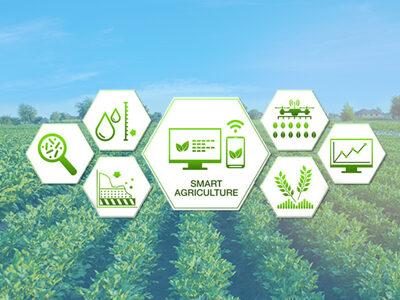Smart Farming: A Revolutionary Step to Transform Indian Agriculture
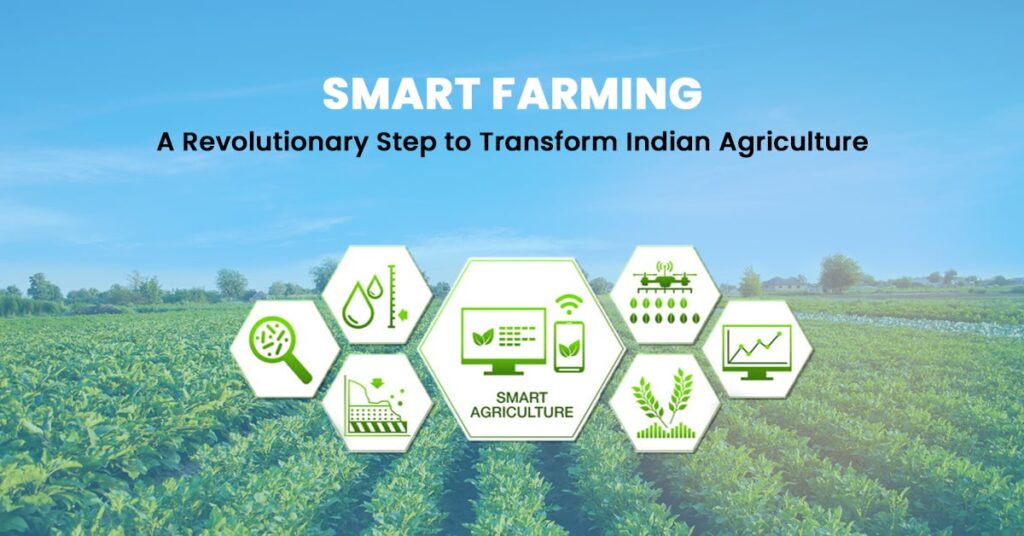
As per the NITI Ayog, Indian agriculture accounts for 18.3% of the gross domestic product (GDP) and nearly 40% of the total rural Net Domestic Product (NDP) during 2020. Due to its significant contribution to India’s economic as well as social growth, it is essential to modernize the traditional farming practices in India with Smart Farming to realize the full potential of India’s Agricultural sector and combat the challenges faced by it.
Traditional Indian Farming Limitations
- Age-old agricultural practices:
Most of the Indian farmers own little farmland and rely on traditional farming practices requiring considerable resources with no use of modern technologies. On top of it, they have no access to modern machinery, storage facilities, recent agricultural trends, and data on weather patterns, soil health, and crop protection.
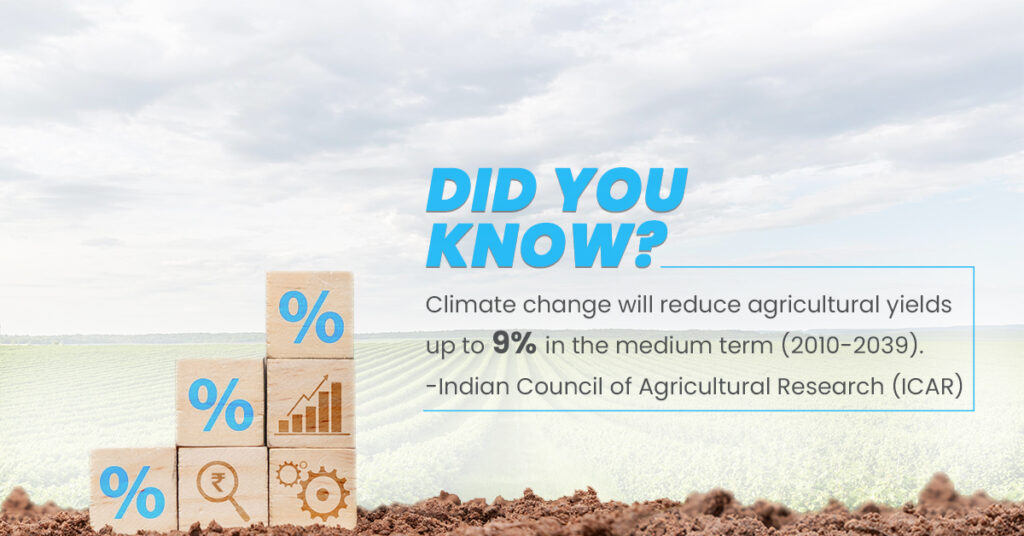
- Unforeseen climate changes and natural disasters:
Un-expected change in weather has been the biggest challenge faced by traditional farmers. It also makes it hard to achieve sustainable farming as it adversely affects the soil and eventually crop yields. Further, it also increases the risk of pests’ attacks. There is no way to mitigate risks caused by natural disasters such as droughts, floods, or inadequate infrastructure.
- Disorganized Supply Chain:
A disorganized supply chain is the leading cause of food wastage everywhere due to a lack of clarity on the supply chain process and coordination between various stakeholders. According to Food and Agricultural Organisation (FAO), nearly 40 % of the food produced in India is wasted every year due to inefficient supply chains even before it reaches the consumer.
- Low Labours:
With the growing urbanization and large population moving to cities, arranging manpower for farming activities remains a challenge.
What is Smart Farming?
Smart farming, as understood by many is the practice of managing farms by leveraging modern technologies such as IoT, robotics, drones, AI, and Cloud Computing to increase the crop yield and its quality while reducing human labour. However, what is the real ‘smart’ factor of this farming style is, gathering data using the said technology from sources like historical, geographical, and instrumental and using it for better decision making.
Furthermore, smart farming also automates the management of soil, water, light, humidity, and temperature. It also focuses on crop monitoring via computers and mobile phones as well as automation of harvest, fertilizer, and irrigation
How technology is transforming farming into Smart Farming
With so much digitization happening across India, and modern technology at the forefront of every industry, it can be efficiently leveraged to build smart farming solutions. With the right use of technology such as Machine Learning, Artificial Intelligence, Cloud Computing, and tools such as robots, sensors, satellites, weather stations, the risk caused by soil issues, climate, irrigation, to supply chain gaps can be mitigated. Technologies such as drones, sensors, GPS guides, and satellites are already contributing to transforming Indian agriculture.
Let’s take a look at the technologies that are leveraged for smart farming.
1. Internet of things to collect information
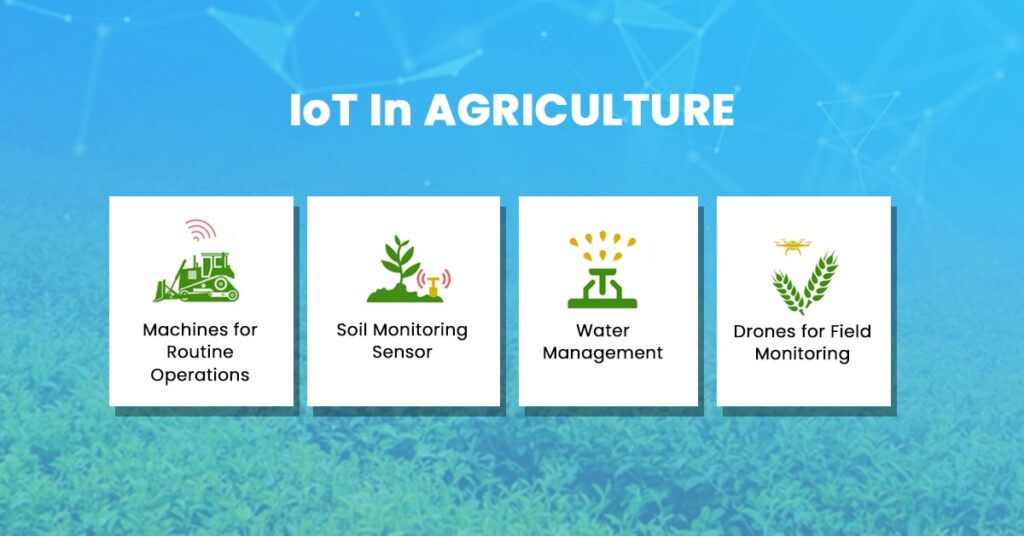
IoT enables devices with sensors such as pumps, sheds, tractors, weather stations, and computers to collect data remotely. This connecting of physical devices makes it possible for farmers to review the farm condition and infrastructure, get faster real-time data of the farming eco-system, ensuring less wastage of resources.
Here are some major benefits of IoT in farming
- Climate Conditions:
Farming is an entirely climate-dependent sector. As much as the climate is unpredictable, it is very crucial to have pre-knowledge about changing weather conditions to enhance the quantity and quality of crops. Sensors distributed across the farms’ helps in predicting the climate conditions.
- Precision Farming:
IoT plays a big role in precision farming. It helps in live-stock monitoring, vehicle tracking, field monitoring, gathering the data, and turning it into actionable insights for smart decision making.
- Smart Greenhouse:
IoT enables weather stations to make the greenhouse smart by letting it automatically adjust climate conditions as per instructions without human intervention required.
- Agricultural Drones:
Agricultural drones are a game-changer in the agriculture sector. Drones are used for reviewing the crop activities such as crop health, crop planting, crop spraying, and field analysis. The key contribution of drones with thermal or multi-spectral sensors ascertains the areas that require irrigation changes.
2. Robotics and Artificial Intelligence (AI)
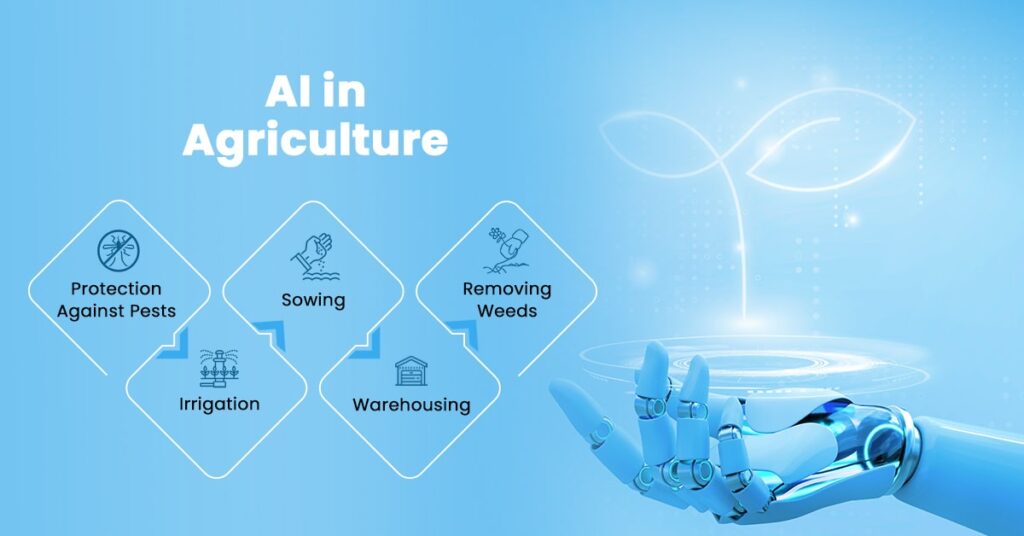
AI is one of the main components of precision farming to improve the overall harvest quality and accuracy. Here are some top uses of AI in smart farming
- Smart Spraying:
The huge data collected through various tools gives insight on weather conditions, temperature, usage of water, soil quality, etc. This data is then used to decide the right crop of season and right time for its sowing seeds, finding hybrid seeds that could generate more yields.
- Robots for Harvesting:
Smart farming aims at lowering manpower requirement for farming and the inclusion of unmanned operations and autonomous decision support systems through the use of robots integrated with AI features. Robots can be used for harvesting large volumes of crops at a faster pace, tackling the labour challenge.
- Predictive Analysis:
AI also helps in evaluating the crop yield, forecast prices to gain profit, identify the weed-affected area, monitoring crop health, and much more.
Smart Farming – the future of Agriculture
Smart farming has already replaced conventional farming in many parts of the world due to its many benefits such as less labour, higher crop yields, and food security. Smart farming is the only strategy for the survival of agriculture. Many global companies have developed smart apps to bring smart farming into reality and empower farmers in India. Famrut is one such innovative ecosystem that delivers future-ready farming solutions and connects farmers with all relevant stakeholders of the entire agricultural sector.
- Top 5 Data Center Trends for 2024 - October 11, 2023
- Top 15 Cloud Computing Trends 2024 - October 4, 2023
- What is Infrastructure Monitoring and Why Infrastructure Monitoring Tool is Important for Your Business? - September 20, 2023
